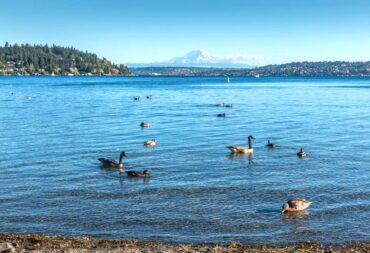 Ducks Unlimited recently announced the top volunteer chapters across the nation honored in three categories for their conservation fundraising efforts. The Kitsap County Chapter received the President’s Roll of Honor, given to chapters that raised between $65,000 and $99,999.
Ducks Unlimited recently announced the top volunteer chapters across the nation honored in three categories for their conservation fundraising efforts. The Kitsap County Chapter received the President’s Roll of Honor, given to chapters that raised between $65,000 and $99,999.
Ducks Unlimited Inc. is the world’s largest nonprofit organization dedicated to conserving North America’s continually disappearing waterfowl habitats. Established in 1937, Ducks Unlimited is guided by science, and has conserved more than 14.5 million acres thanks to contributions from more than a million supporters across the continent.
The other two categories are Chairman’s Roll of Honor (for chapters raising between $250,000 and $999,999) and President’s Elite ($100,000 and $249,999).
“These fundraising events are the backbone of DU’s habitat conservation efforts, and the volunteers who make up these chapters are the force making a difference for North American waterfowl populations,” said DU President Rogers Hoyt Jr. “It takes a great deal of effort to achieve these levels, and these chapters deserve to be congratulated by every person who enjoys the outdoors.”
Other chapters recognized this year in Washington state include: Seattle (Chairman’s Roll of Honor); Vancouver (President’s Elite); and Tri-Cities (Kennewick), Snoqualmie Valley (Issaquah), Ballard, Quincy, Olympia, Federal Way, Lewis River Valley (Woodland), and Spokane Valley (President’s Roll of Honor).
The chapters honored earned their spots on the nationally recognized lists out of more than 2,600 DU chapters nationwide that hosted more than 4,200 fundraising events. DU’s event fundraising system has become a model for other conservation organizations worldwide and has helped conserve more than 14 million acres of waterfowl habitat since 1937.
“The hard work and dedication from DU’s event system volunteers and staff drive the organization’s conservation mission from a financial, membership and policy strength perspective,” Hoyt said. “DU chapters across the country are showing that the future of waterfowl populations and the wetlands that filter our water and protect us from flooding are important to them and to their communities. The more money we raise, the more habitat we can conserve and the closer we are to preserving our waterfowl hunting heritage.
For more information, visit www.ducks.org.








